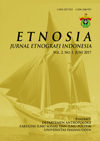Abstract
Tu tamanang is a Makassar term for bad soil (butta kodi) for women and bad seed (biné kodi) for men, as sexual intercourse is analogised with planting (lamung-lamung). Whether or not one is considered as tu tamanang is not based on biomedical check-up, but simply on the basis ofmarital duration (5 years and more) and the attributes attached to tu tamanang which may be different by gender. The importance of the existence of children in the family has caused social stigma among tu tamanang. Such stigma is based on the attributes that can be observed, the gendered parable, the reproductive health-related perception towards the couple, and the label that tu tamanang are infortune persons. In dealing with such social stigma, tamanang women tend to be passive, while men are more aggressive, by showing their refusal to stigma through polygyny or divorce to get married. However, women also become agents in regard to divorce and polygyny. But, refusal towards social stigma is also the case for couple who does not problematised lack of children in the family, and tamanang is not simply a source of conflict. Stigma towards tu tamanang significantly affects the social life of tu tamanang, which is classified into 3 categories: self-isolation, demanding divorce and polygyny. There is a need to educate the society regarding the cause of infertility and how to deal with it, since existing various stigma against tu tamanang are based on social perception, which are non-medical and presumption. In addition, since biomedical service is not the main priority for tu tamanang, they need relevant information regarding existing service and service procedures because even though they access medical service, it has never been continued. This is because accessing medical service is identical with handling of various documents which they consider rather complicated.
References
Arif, Fhadillah A. 2007. ‘To Manang’: Suatu Kajian Sosial Budaya Pada Masyarakat Bugis di Desa Patimpeng Kabupaten Bone. Makassar: Skripsi, Universitas Hasanuddin.
Aizid, Rezim. 2010. Mengatasi Infertilitas (Kemandulan) Sejak Dini. Jogjakarta: FlashBooks.
Al-Iraqi, Butsainah As-Sayyid. 2010. Tip Menjadi Wanita Idaman Sepanjang Masa. Jakarta: Klinikal Mahira Buku Sehat.
Beni dan Anggal. 2001. ‘Nilai Anak dalam Pembangunan: Kerentanan Sosial Anak Jalanan di Tengah Pembangunan’, Warta Demografi, 31(4):4-11.
Bennett, Linda Rae. 2017. ‘Indigenous Healing Knowledge and Infertility in Indonesia: Learning about Cultural Safety from Sasak Midwives’, Medical Anthropology, 36(2):111-124.
Bennett, Linda Rae; Wiweko, Budi; Bell, Lauren; Shafire, Nadia; Pangestu, Mulyoto; Adnyana, I.B. Outa; dan Hinting, Aucky; dan Amstrong, Gregory. 2015. ‘Reproductive Knowledge and Patient Education Needs among Indonesian Women Infertility Patients Attending Three Fertility Clinics’. Patient Education and Counselling, 98:364-369, http://www.pec-journal.com/article/S0738-3991(14)00489-3/pdf, diakses tanggal 17 Januari 2017.
Bennett, Linda Rae. 2012. ‘Infertility, Womenhood and Motherhood in Contemporary Indonesia’. Intersections, Maret, 28, diakses tanggal 21 April 2017.
Bennett, Linda Rae; Wiweko, Budi; Hinting, Aucky; Adnyana, I.B. Putra; and Pangestu, Mulyoto. 2012. ‘Indonesian Infertility Patients’ Health Seeking Behaviour and Patterns of Access to Biomedical Infertility Care: An Interviewer Administered Survey Conducted in Three Clinics’, Reproductive Health, 9:24, https://reproductive-health-journal.biomedcentral.com/articles/10.1186/1742-4755-9-24, diakses tanggal 15 Maret 2017.
Burn, August; Lovic, Ronny; Maxwell, Jane.; dan Shapiro, Katharina. 2005. Bila Perempuan Tidak Ada Dokter. Yogyakarta: Insist Press.
Connor, Linda. 2001. 'Healing powers in Contemporary Asia,' in Linda Connor and Geoffrey Samuel (eds.). Healing Powers and Modernity: Traditional Medicine, Shamanism, and Science in Asian Societies. Westport: Bergin and Garvey, 3–25.
Demartoto, Argyo. 2008. Dampak Infertilitas Terhadap Perkawinan: Suatu Kajian Perspektif Gender. Laporan penelitian. Surakarta: Universitas Sebelas Maret.
Ferzacca, Steve. 2002. 'Governing bodies in New Order Indonesia in Charles Lesley (ed.), New Horizons in Medical Anthropology. London: Routledge, 35–57.
Greil AL. 1991. ‘A Secret Stigma: The Analogy Between Infertility and Chronic Illness and Disability’, Advances in Medical Sociology, 2:17–38.
Greil AL. 1997. ‘Infertility and Psychological Distress: A Critical Review of the Literature’. Social Science and Medicine, 45(11):1679–1704.
Greil, Arthur L.; Slauson-Blevin, Kathleen; and McQuillan, Julia. 2010. ‘The Experience of Infertility: A Review of Recent Literature’, Social Health Illn., Januari, 32(1):140-162.
Idrus, Nurul Ilmi. 2016. Mana’ dan Eanam: Tongkonan, Harta Tongkonan, Harta Warisan, dan Kontribusi Ritual di Masyarakat Toraja. Etnosia: Jurnal Etnografi Indonesia, 1(1): 13-26.
Indrizal, Edi.2014. ‘Problematika Orang Lansia Tanpa Anak Di Dalam Masyarakat Minang Kabau Sumatera Barat’. Universitas Andalas. Padang
Kompas. 2017. ‘Program KB Penting Bagi Pasangan Muda’, Kompas, 23 Juni, 4.
Mubarak, Wahid Iqbal. 2009.Ilmu Kesehatan Masyarakat.Jakarta: Salemba Media.
Munir, Rozy. 1986. Hubungan Antara Nilai Anak Dengan Pemilihan Besar-Kecilnya Jumlah Anak di Perkotaan. Jakarta: Kantor Menteri Negara Kependudukan dan Lingkungan Hidup dan Pusat Penelitian Pranata Pembangunan Universitas Indonesia.
Papreen, N., Sharma, A., Shabin, K., Begum, L., Ahsan, S.K., and Baqui, A.H. 2000. ‘Living with Fertility: Experiences among Urban Slum Populations in Bangladesh’, Reproductive Health Matters, 8(15):33–44.
Pranata, Setia. 2009. ‘Infertilitas di Kalangan Laki-laki Madura: Studi tentang Permasalahn Sosial dan Konsekuensi Infertilitas’, Buletin Penelitian Sistem Kesehatan, 12(4):393-402.
Rahmani, D.P. dan Abrar, A.N. 1999. Infertilitas Dalam Perspektif Gender. Yogyakarta: Pusat Penelitian Kependudukan, Universitas Gadjah Mada.
Suwaid, Muhammad. 2004. Mendidik Anak Bersama Nabi. Solo: Pustaka Arafah.
Tussadiyah, Halimah. 2015. Hubungan Antara Infertilitas Pada Pasangan Suami-istri Dengan Terjadinya Gangguan Harga Diri Rendah RW 08 Kelurahan Kemayoran Kecamatan Krembangan Surabaya. Surabaya, Skripsi, Universitas Muhammadiyah Surabaya.
Yebei, Violet Naanyu, 2000. ‘Unmet Needs, Beliefs, and Treadment Seeking for Infertility among Migrant Ghanaian Women in the Nederland’, Reproductive Health Matters, 8(16):134-141.





